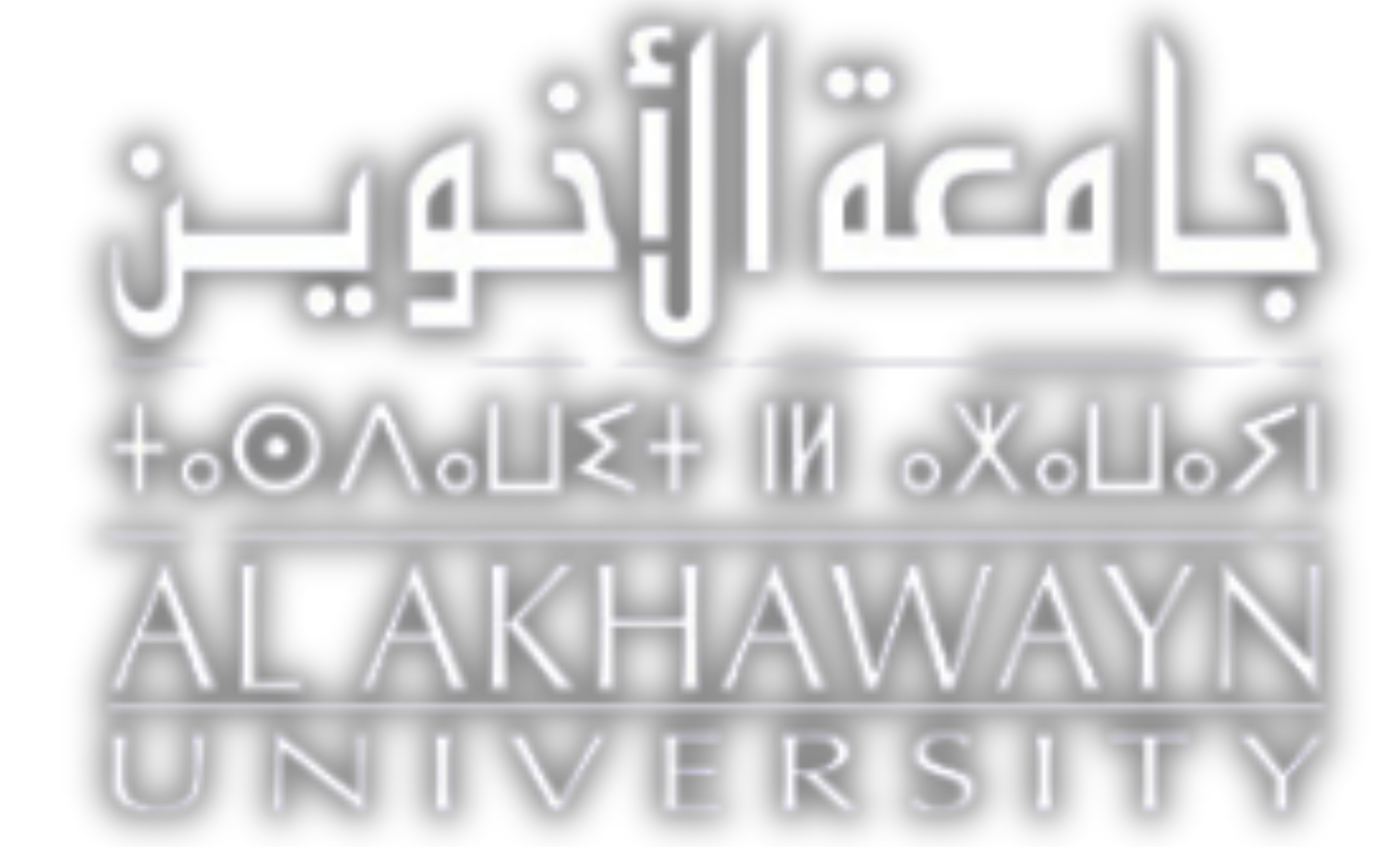

From Ifrane to Casablanca
AUI’s Executive Certificate in Trading is Here
Download our Brochure
Fill in your details to access our brochure
A Few Words
About the University
Founded in 1993, Al Akhawayn University in Ifrane (AUI) is an independent Moroccan institution focused on developing future leaders through a globally-oriented, American-style education, emphasizing academic excellence, and ethical standards.
A Legacy of Institutionnal Accreditations



Al Akhawayn’s Executive Education Center (EEC)

Executive Learning in the heart of
Casablanca
Casablanca
Executive Learning in the heart of Casablanca
EEC offers over 13 years of expertise, providing top-tier executive training tailored to Morocco’s economic landscape. With a network of national and international experts, it delivers programs based on the Anglo-Saxon model for students and professionals in public and private sectors.
Bridging Academia and Trading Expertise

In Partnership with Experts
Lotus Capital is Morocco’s first private trading company. Exceeding benchmarks through advanced data analytics and quantitative strategies, Lotus Capital brings cutting-edge technology in global financial markets. This collaboration provides AUI students with unique access to industry insights and professional development opportunities.

Lotus Capital Expands with LCA
Lotus Capital is proud to launch Lotus Capital Academy (LCA) to bridge the gap in specialized finance and trading education in Morocco. Delivered through partnerships with top tier universities and taught by industry experts, LCA shares professional insights, combining real-world expertise with academic learning to equip students with the skills needed for success in the financial industry.
Key Concepts
- Market Dynamics
Decipher the interplay of technical and fundamental factors to anticipate market shifts and capitalize on emerging trends.
- Risk-Adjusted Returns
Implement risk assessment and portfolio diversification techniques to achieve peek performance while safeguarding capital.
- Algorithmic Trading
Utilize advanced algorithms to automate trade execution, ensuring speed, accuracy, and optimal market timing.
- Quantitative Trading
Harness data-driven models and statistical techniques to identify market opportunities and optimize trading strategies.
- Portfolio Construction
Learn constructing and managing diversified portfolios using dynamic allocation and risk-adjusted performance metrics.
- Behavioral Finance
Explore psychological biases and decision-making traps that can impact trading performance and learn to overcome them.
Your Learning Journey
- Market Dynamics and Economic Drivers : Analyze market structures and economic drivers, focusing on central bank interventions and supply-demand dynamics.
- Asset Classes and Market Segmentation : Differentiate between asset classes across primary and secondary markets, including cryptocurrencies and traditional instruments.
- Derivatives and Advanced Valuation : Master derivative instruments, including futures and options, using advanced models like Black-Scholes for valuation and hedging.
- Risk Management and Market Roles : Evaluate the roles of hedgers, speculators, and arbitrageurs within the derivatives landscape, optimizing risk exposure.
- Trader Styles and Strategic Execution : Compare trader styles—scalping, day trading, swing trading—through applied case studies and strategic analysis.
- Market Participants and Financing Dynamics : Analyze the roles of retail traders, institutional investors, central banks, and corporations in market dynamics, comparing debt vs. equity financing.
- Fundamental Analysis and Economic Indicators : Understand the role of economic indicators, macroeconomic cycles, and news impacts in shaping global financial markets.
- Asset Correlations and Order Book Mechanics : Explore asset correlations and order book dynamics, assessing liquidity through bid-ask spreads and order flow visualization.
- Technical Patterns and Sentiment Indicators : Identify key chart patterns and technical indicators, integrating market sentiment analysis to confirm trade strategies.
- Risk Management and Capital Allocation : Master risk management fundamentals, leverage, and capital allocation across diverse asset classes to optimize portfolio diversification.
- Advanced Financial Analysis and Valuation : Examination of complex financial statement analysis and advanced valuation techniques, including DCF and economic value added (EVA) methodologies.
- Financial Engineering and Risk Management : Study of financial engineering principles, focusing on interest rate derivatives and comprehensive risk management frameworks to enhance capital allocation.
- Portfolio Theory and Strategy Optimization : Exploration of modern portfolio theory (MPT), covering the efficient frontier, Sharpe ratios, and mathematical programming for optimal asset allocation.
- Derivatives Trading: Speculation, Hedging, and Arbitrage : Analysis of speculative and hedging strategies in derivatives, emphasizing arbitrage opportunities and their market implications.
- Quantitative Finance: Theory and Practice : Introduction to quantitative finance, focusing on statistical methodologies, algorithmic trading strategies, and machine learning integration in trading systems.
- Market Microstructure and Trading Mechanisms : Examination of market structures, including order flow dynamics and liquidity analysis, and their effects on price formation and execution strategies.
- Advanced Quantitative Modeling and Financial Analytics : Application of statistical techniques and multivariate time series analysis for forecasting and modeling in finance, including advanced derivative pricing and predictive analytics.
- Automation Fundamentals : Understand the basics of trade automation, including its definition, benefits, and the essential prerequisites for implementing automated trading systems.
- Types of Automation : Explore various automation strategies in trading, such as algorithmic trading, high-frequency trading (HFT), and the use of artificial intelligence (AI) and machine learning (ML) for signal-based trading and social trading.
- Data Collection Techniques : Learn about data providers and acquisition methods, including real-time market data, historical data, and web scraping techniques for gathering essential trading information.
- Data Manipulation and Storage : Discover different data formats, types of storage solutions, and the processes for acquiring, transforming, and persisting trading data effectively.
- Bot Creation and Design : Gain insights into designing trading bots, including defining objectives, choosing programming tools, developing trading strategies, and implementing risk management modules.
- Backtesting and Simulation : Understand the importance of backtesting in trading strategies, including the creation of simulation engines, historical data collection, and adapting bots for backtesting purposes.
- Practical Application and Performance Optimization : Engage in hands-on practical exercises, advanced performance optimization techniques, and the use of simulation tools to refine bot strategies for real-world trading conditions.
Who Will Benefit
Aspiring Traders
Experienced Traders
Career Transitioners
Finance Professionals
Investors
Aspiring Traders
Individuals eager to embark on their trading journey and establish a solid foundation in market analysis, trading strategies, and risk management.
Experienced Traders
Seasoned market participants seeking to refine their expertise, acquire cutting-edge strategies including algorithmic trading, and maintain a competitive edge.
Career Transitioners
Individuals ready to pivot their careers and harness their passion for finance by transitioning into the dynamic world of trading.
Finance Professionals
Finance professionals seeking to broaden their expertise by integrating trading acumen into their financial skill set.
Investors
Investors aiming to enhance their portfolio management skills and leverage trading techniques for better returns.
Our Difference

Focus on Advanced Strategies
Deep dive into algorithmic trading, quantitative analysis, and sophisticated risk management techniques.
Exclusive Access to Technology
Utilize professional-grade trading technology and analytics tools reserved for industry insiders.
Executive-Level Perspective
Benefit from a prestigious academic infrastructure and commitment to delivering high educational quality.
Industry Expert Faculty
Learn directly from professionals with hands-on experience from top trading floors worldwide.
Career-Focused Networking
Connect with industry leaders and peers to build a robust network for career advancement.
Practical, Hands-On Learning
Apply theoretical concepts directly to real-world trading scenarios through simulations and case studies.
Our Professors
Jaafar Benkirane
Director of Interest Rate Risk in the Banking Book – Deutsche Bank
Hamza Bekkali
Senior Fund Manager Multi Asset Head of International Investments – CDG Capital Gestion
Imad Jabbouri
Professor of Finance at the School of Business Administration – Al Akhawayn University in Ifrane
What you’ll Earn
Upon successfully completing the trading program, students will receive certificates at each level, culminating in the prestigious Executive Certificate in Trading after fulfilling all requirements.
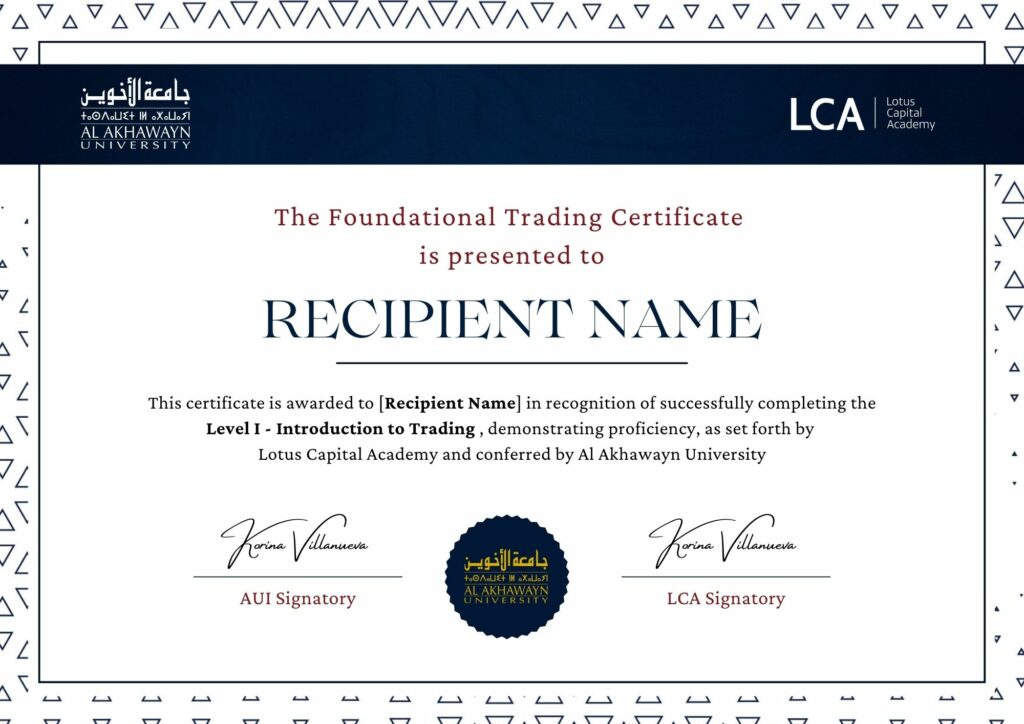
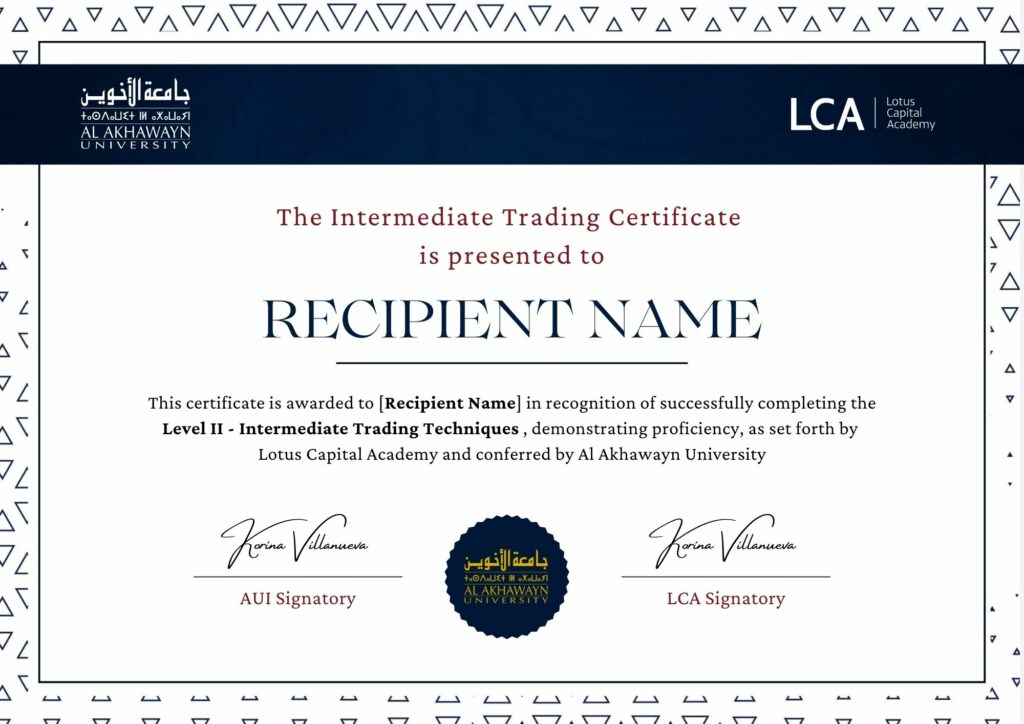

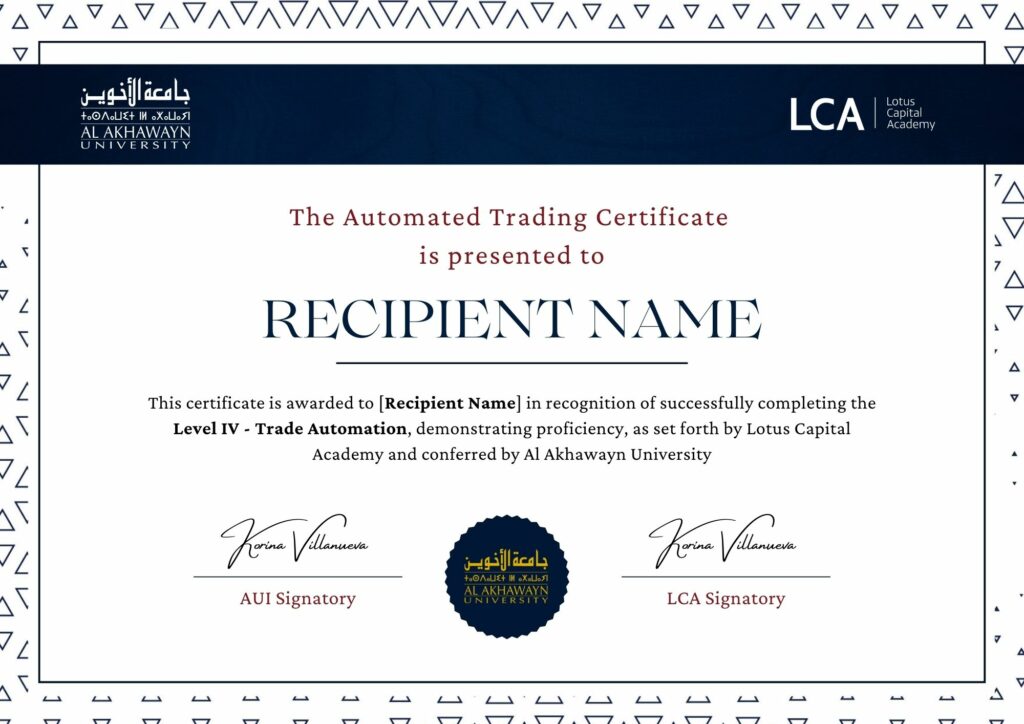
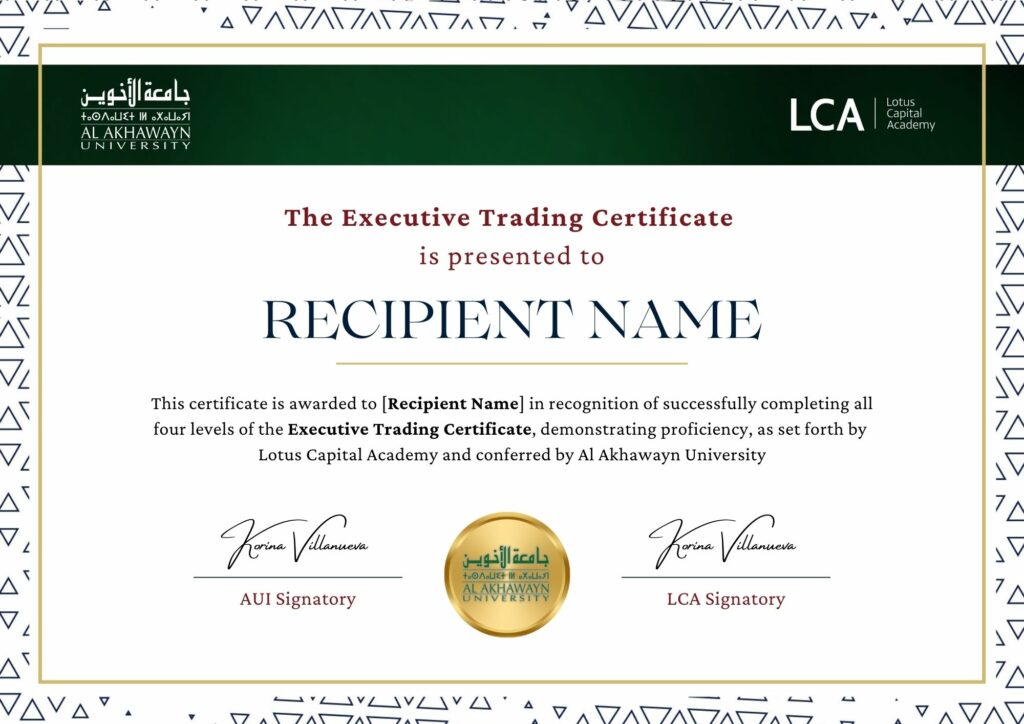
Get in Touch
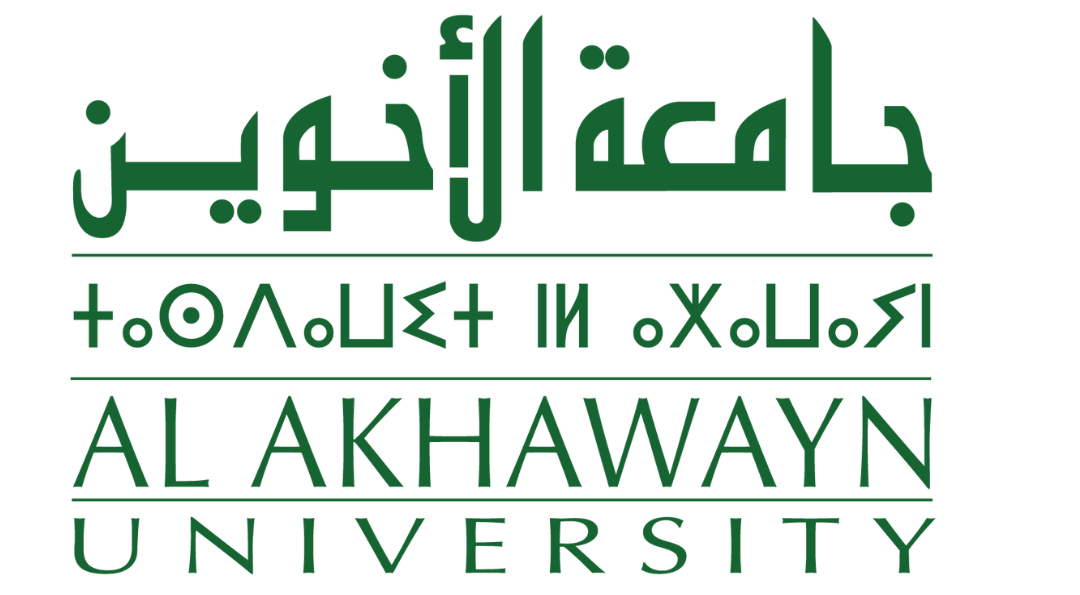
Address : Casablanca-route de nouasser Technopark Casablanca
Mail : eecc@aui.ma
Phone : +212 5225-03664
Mail : eecc@aui.ma
Phone : +212 5225-03664

Address : 73 Bd Anfa, 2nd floor, office 205- Casablanca
Mail : contact@lotuscapital-academy.com
Phone : +212 520 748 060
Mail : contact@lotuscapital-academy.com
Phone : +212 520 748 060
FAQ
The program is entirely taught in English.
Candidates need a baccalaureate and an analytical mindset. A genuine interest in financial markets and trading is also advantageous.
Courses are delivered online on Fridays with a 3-hour session and in a classroom setting on Saturdays with a 6-hour session.
The program primarily focuses on international markets. However, our instructors will provide insights into domestic markets when relevant, helping students adapt their knowledge based on their future interests and career goals.
The program includes a diverse group of esteemed professionals and experts, drawn from leading international and national trading floors. These distinguished individuals possess extensive hands-on experience in real market environments and will be responsible for delivering the courses.
This comprehensive program covers foundational trading concepts as well as advanced quantitative and algorithmic strategies, including both institutional and speculative approaches. Graduates will be well-equipped to pursue careers in financial institutions or trading floors, or to achieve personal trading goals.
Yes, top students in this program have the opportunity to intern with Lotus Capital, gaining hands-on experience in a cutting-edge trading environment specializing in quantitative and algorithmic strategies in international markets.
Students receive a certificate upon completing each level. The Executive trading Certificate is awarded upon the completion of Level 4.